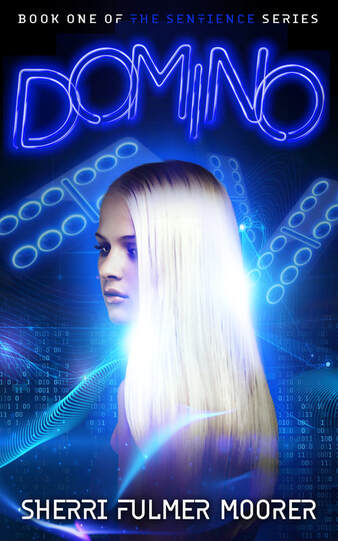
Domino takes place in the year 2175. Human beings have neural chips implanted in their brains prenatally to help them integrate with technology better, and to enhance healthcare and mental functioning. The neural chips are the first step toward integrating man and machine. The next step: create a program that copies the neural maps and information from the chips online, so the information can be accessed after the individual passes away. A program called Domino is created by two of the descendants of the man who worked on the neural chips at a small university in western South Carolina. The team has been working for years to integrate terminally ill patients into the system, and to prepare them for integration with the World Wide Web. This isn’t just the next step toward evolution, but the first step toward immortality.
Too bad it doesn’t work.
The research team discovers that the information downloaded from the neural chips isn’t integrating to Domino like it should. What’s worse, the individuals they access through the system seem to be “stuck” in the state they were in when their code was downloaded. The code isn’t continuing to build and grow as it should. Then there’s an accident in the lab, and the University wants to pull the plug on a project that they see as not only doomed, but dangerous. In desperation, one of the team members, Kasei Marculya, downloads herself into the system. Unfortunately, she finds herself in Domino with a virus that succeeds in killing her physical body. Her “code” survives and escapes to the Internet, but she realizes something shocking: Domino doesn’t work because somebody is sabotaging it. Now she must find out who and why, while trying to adapt to life inside the system.
The theme of Domino is learning to live with things you can’t change. I think we’ve all had experiences with people not understanding that there are some things you can’t change, and you have to learn to live with them. This is an issue I’ve been dealing with first with the loss of Chloe, my companion parrot, in 2017, and more recently this past summer with the loss of my Dad. As I wrestled with learning to live with these voids in my life, I was shocked by the number of people – some of them in their mid to late 30’s! – who didn’t seem to understand the concept that not all things can be controlled or fixed. In fact, very little is actually under our control. All we really can control is how we respond to the strange nature, events, and circumstances of life. I learned this lesson when my grandparents died when I was in pre-teens, and I’ve been building on them as an adult over the past 3+ years. Apparently, most people are more fortunate than me in that regard, because they make it well into adulthood without having to deal with this ugly truth.
There’s a reason why people don’t understand it until it socks them in the stomach: our culture doesn’t acknowledge this truth, and it's one we all experience throughout life. We live in a society that believes there’s a fix for everything and worse yet, tends to cast blame when something bad does happen to you. There is a blame culture when you experience tragedy. It’s part of the reason why I don’t like to talk about Dad’s passing. People are so scared of trauma that they try to avoid it by developing explanations and even casting blame for the unexplainable.
Nobody gets through this life without being touched by the chaotic nature of the universe. We need to know that sometimes our best efforts will fail. We need to learn that experiencing failure doesn’t make us a failure. We need to know that things happen with permanent consequences that we can't and never could control. We need to learn that the unexpected happens and can throw everything we know about life off track. We need to learn how to continue to move forward and grow in the face of the unexpected. The world isn’t safe. It also isn’t predictable, or controllable. But it’s possible to still have a good life if you can learn how to live with the pain that goes with the joy of being alive.
I hope Domino helps in this regard. I’ve found that people tend to take these messages better through fiction than they do in reality. I think it’s because fiction allows them to experience the story through their own perspective, and decide how it applies to them. It holds up a mirror to let them see themselves through an outside perspective that might reflect things they aren’t able to know solely from the inside. We all need that outside perspective to help us see the bigger picture. Our tunnel vision only widens when we open ourselves up to the wider world.
Domino is available for pre-order now at Amazon and Smashwords for $0.99. To celebrate the release, I’m also offering a couple of Kindle Direct Deals on Amazon for some of my other works (since Amazon is where most of my book sales occur). The Tanger Falls Mystery is free through Friday (February 26) and The Earthside Trilogy will be free March 1-5.
Happy reading, folks! I hope these ebooks inspire and entertain you.
That’s all today. Take care, and have a great rest of the week.
Bye!
 RSS Feed
RSS Feed